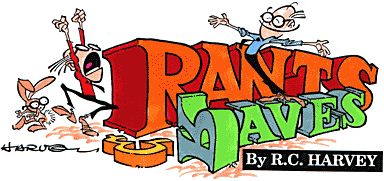| |
Opus 23:
1. More
Peeves and Plaudets (3/22)
1. More
Peeves and Plaudets. Here's a genuine miscellany, a
hodge-podge of notions from hither and yon. With li'l subheads,
too.
Simpsons Bombs. The Sunday
strip spawned by the Fox Network's
with-it animated TV show ran into trouble almost at once. An
early
episode had one of the characters chopping off the fingers of one
hand, for instance--hysterically funny, no doubt, on television, but
fairly ghastly in static print where the harmlessness of such cartoon
violence can't be dramatized with movement. After a couple
installments like this, several papers dropped the feature. And
I
have to say, I agree with their action: dismemberment ain't really
funny except in animation.
Awards & Notices. A press
release from United Media notes that Over
the Hedge, written by Michael Fry and drawn by T Lewis, won the
Religious Communicators Council's 1998 Wilbur Award for "excellence
in the communication of religious issues, values, and themes." In
the award-winning entries, the strip's main characters--RJ the
raccoon and Verne the super-sensitive turtle--ponder the origin of
humanity, the plausibility of reincarnation, and the eternal
question: Is God a turtle or a raccoon? Said Lewis: "We've
touched
on stupid topics, life and death topics, and spiritual topics.
Winning the Wilber is particularly satisfying because it means
sometimes we get it right."
And in Jump Start, cartoonist Robb Armstrong
devoted a week's strips
to one of his nurse heroine's patients who was coming to terms with
being paralyzed. He got the idea for the series after speaking
before the New Jersey Coalition on Women and Disabilities. Touched
by the up-beat and positive people he met, Armstrong decided he could
turn the experience into an inspiring story in the strip. "I
wanted
to get people to think about these experiences because people have a
very hands-off attitude toward the whole topic of disabilities. It's
uncomfortable--just like any other kind of bias. People pretend
it's
someone else's concern, but it's not."
Editorial Strippers. According
to David Astor in E&P (September 18,
1999), more and more editorial cartoonists are doubling on a comic
strip these days. In E&P's directory for 1989, only 12
editorial
cartoonists also produced a comic strip; this year, that number is
20. The trend may be inspired by any of three circumstances:
(1)
editorial cartoonists need something to fall back on in a time when
they fear for their livelihoods as the number of full-time editorial
cartoonists diminishes; (2) happy readers in good times don't want to
see heavy opinionated cartoons--they want to laugh--so cartoonists
give them what they want; and/or (3) syndicates are inclined to want
features that they can sell, and it's easier to sell a feature by a
well-known cartoonist than one by an unknown. But Mike Luckovich,
who draws editorial cartoons for the Atlanta Constitution and who
launched a comic strip, SuperZeroes, in January, says he's doing the
strip because it's fun and it's a different creative challenge.
Purely delightful. That's the
only way to describe a new comic book
in black-and-white by Canadian Alan Bunce. Called ZZZ ($2.35),
Bunce's book gives us the dream adventure of an unnamed old geezer
who encounters a genii in a jug. Not a word appears in this
book's
pages, 4 tiers of 2 panels each. A pantomime adventure. And
Bunce
is expert at presenting just the right amount of information--no
more, no less--that we need to understand the action, panel-by-panel.
But it's the drawings themselves that enchant. Bunce's
style is
reminiscent of Bill Watterson's work on Calvin and Hobbes--although
it is by no means at all derivative. But it has that feel--nice
brushwork, diminutive figures, all heads and feet. The old
geezer's
pet cat is just perfect--all ears and paws, a black dot running after
its master. The cutest comic art cat since Gus Arriola's
Poosy Gato.
Most of the panels are laden with just the right amount
of
background detail, rendered in a fine line and crosshatched a little
in contrast to the bolder linework of the figure drawings in the
foreground. Lots to look at and wander through. A
genuine comic
book experience. Delicious. Here's hoping we see
more of this one.
Spelling B. The black-and-white
comic book Alphabet Supes by Jim
Krueger is about 26 superheroes, each representing a different letter
of the alphabet ($3). And their somewhat whimsical adventures,
it
would appear, are going to be about spelling and word games and
punctuation and the like. It's a charming concept. And
Krueger does
well by it in his first outing. We enter during a dispute
between
"I" and "E" about which is to be the leader. "I before E,"
says I.
Then when Chrissy "gets in the middle" of the dispute, the characters
spell ICE. And they're promptly frozen. For the
rest of the book,
their cohorts labor to unfreeze them. In future issues, we
might see
"Y" trying to understand her place in the team: is she a vowel or a
consonant? And then there's "S"'s adventure: she gets an
apostrophe
necklace from an admirer and immediately starts taking possession of
everything. Superheroes for wordsmiths. No wonder
Mark Waid loves
it.
Stay 'tooned.
return
to top of page

return to archive main page
To find out about Harv's
books, click here.
|

